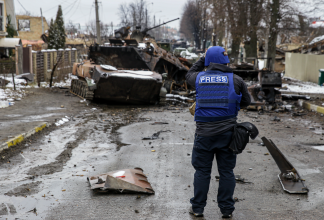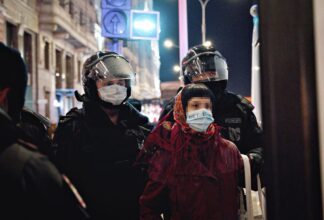Human Rights Defender Brutalised and Sentenced on Fabricated Charges
Civil Rights Defenders condemns the conviction of Zhalaudi Geriev, a reporter with the Russian news site Caucasian Knot, for three years imprisonment for possession of narcotics. According to his lawyers and independent accounts, Geriev’s conviction was based on a forced confession, fabricated evidence, and numerous violations of legal procedures and basic human rights.
Geriev, who is 23, was targeted because of his journalistic activities. Along with his colleagues at Caucasian Knot, which has no central office and whose journalists often publish anonymously for their and their families’ safety, Geriev wrote regularly about human rights violations in the Russian republic of Chechnya.
“The sentencing of Zhalaudi Geriev is alarming, and another reminder that the Russian government has no intention of reining in Ramzan Kadyrov’s abuse of Chechen citizens. It is a clear violation of the freedom of the press. The Swedish foreign minister Margot Wallström and her EU-colleagues should call on the Russian government to comply with its international human rights obligations and guarantee Zhalaudi’s right to due process,” said Joanna Kurosz, Programme Director for Eurasia, Civil Rights Defenders.
Geriev was originally detained on April 16 on his way to Grozny, the Chechen capital, to fly to Moscow for a professional seminar. Three men in civilian clothes pulled him from public transit, forced him into a black sedan, confiscated his laptop and phone, and drove him to a forest roughly 40 minutes outside the city.
There he was questioned, apparently on suspicion of trying to traveling to Syria to wage jihad. Another man arrived and placed a plastic bag over Geriev’s head, and left it on until he began to suffocate. His wrists were tied with wire, and he was forced into another car. Eventually, Geriev arrived in a cemetery another about thirty minutes away, where he was handed over to law enforcement and forced to confess to possession of several grams of marijuana.
He recanted the confession at his trial, and his lawyers argue that little, if any, of the proceedings against him are in concordance with Russian legal or criminal procedures. Among other absurd details, the prosecution could not explain how Guriev intended to ingest the planted marijuana, as no paraphernalia or lighters were admitted into evidence. Complaints that defense witnesses were under extralegal pressure went uninvestigated.
Civil Rights Defenders, other human rights organisations, and local monitors have remained silent throughout Geriev’s ordeal at the request of his family, who were assured by a high-ranking Chechen law enforcement officials that avoiding publicity would result in a more lenient punishment.
Attacks against the press and active citizens are common in Chechnya, which has been ruled by the autocratic Ramzan Kadyrov since 2007. Under Kadyrov, who rules Chechnya as his own personal fiefdom, torture and forced disappearances of critics are commonplace, and collective punishment of whole families and public humiliations are no longer exceptional. He is suspected of ordering assassinations of Chechens abroad in Russia, Turkey, Dubai, and Austria, as well as the murders of the journalists Anna Politkovskaya, Natalya Estemirova, the liberal opposition politician Boris Nemtsov, and many others.
Kadyrov’s repressive tendencies have only grown more pronounced in recent years, and especially so as he faces the first public election in his near-decade in absolute control of the republic. Although the outcome is not in doubt, the Chechen strongman may be communicating the cost of embarrassing him through public shows of dissent.
Geriev’s lawyers are appealing his case to a higher court, and Russian authorities should act to investigate the trial proceedings, the circumstances of his arrest, and the culture of impunity in general that has developed under Kadyrov.


